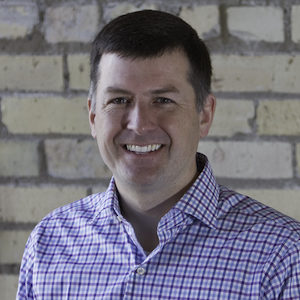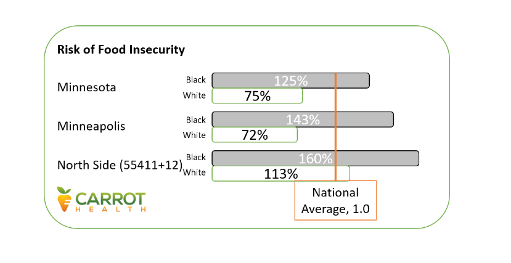
Kurt is a serial entrepreneur with a career spent building solutions to understand, predict, and influence consumer behavior. Kurt has built successful analytic solutions, products and companies in the healthcare, retail, and education/credentialing industries. His previous companies were sold to Oracle and Pearson Education. Most recently, Kurt was responsible for Product Strategy at Optum, Inc. (UnitedHealth), building data analytic businesses for the Provider, Payer and Employer markets.
Kurt holds a Master of Business Administration from the University of Minnesota Carlson School of Management and a Bachelor of Arts in Political Science/Technology & Policy Studies from Carleton College.
When not working with customers, Kurt is with his wife, Tracy, guiding their three children toward adulthood, and planning their next winter camping trek into Minnesota’s Boundary Waters Canoe Area Wilderness.
What is Carrot Health’s mission?
Carrot Health’s mission is best introduced through this Robert F. Kennedy quote from 1968:
“Health care and poverty are inseparable issues and no program to improve the nation’s health will be effective unless we understand the conditions of injustice which underlie disease. It is illusory to think that we can cure a sickly child and ignore his need for enough food to eat.”
Carrot believes in enabling a future where each of us has no barriers to leading our healthiest lives. Unfortunately, health in this country is distributed very inequitably. In the Twin Cities we have communities with a 30-year gap in mortality: Medina at ~90 years, Frogtown in St. Paul at ~60 years.
That distribution is often based on lines drawn by racism. Take food insecurity. Those who struggle to get enough to eat report the highest levels of poor health – exacerbating nearly every medical condition.

In Minnesota, the ‘average’ person has much better access to food than the national average – only 75% of the national risk. Until we look at the data by race – in North Minneapolis, a family has 1.6x the likelihood of food insecurity, compared to the nation as a whole.
To fix this, we need to look upstream in the healthcare system, and remove the barriers that are driving poor health to begin with. Why are so many people hungry in a state with so many resources? How do we change the system, instead of relying on food shelves & emergency rooms?
Carrot Health believes that shining the bright light of data onto our disparities will help us change health outcomes and reverse the 50-year decline driven by barriers to health, forever.
What was your original plan for 2020 and how has that changed?
Carrot Health is continuing to expand across the customer landscape. We serve health care payers, providers, employers, and those at-risk for the health outcomes of their populations.
With our communities reeling from the pandemic and associated economic shocks, the need to identify risks and intervene has never been greater. Carrot is finding a resurgence of demand for insights – those populations that were struggling on the margins of food, housing, and income and now in full blown crisis.
Given the breadth of the issues you could address, how do you narrow your focus?
We focus on the issues that are the highest priorities for our customers — revenue growth, population health, and quality improvement (such as gap closure & Star ratings). Our software-as-a-service solutions are tailored to the communities that our customers serve. Using the Carrot MarketView™ platform, we start with an opportunity assessment that helps them identify the unique fingerprint of risk they are facing, and where they can engage consumers to have the most impact.
What are the biggest challenges your organization faces when it comes to realizing health equity?
As a nation, we spend our dollars in the wrong places. Our funding is upside down; we wait for people to become sick, and then spend to patch them up. If we redeploy that capital upstream to remove the barriers that cause people to become sick in the first place, we will lower the cost of care and allow people to live longer, healthier lives. The biggest challenge to Carrot Health and our customers is to use the bright light of data to change those models for everyone’s benefit.
How do you measure success?
Measurement is our business. We continually evaluate the risks, changes in behavior, and impacts of our work to identify where we have helped and how we can do better. Ultimately, that impacts long-term measures like total cost of medical care and mortality.
Have 2020’s major events fundamentally changed what you want the organization to focus on going forward?
This is very personal for me.
I live with my family three short blocks from Lake Street in Minneapolis. On Monday, May 25, 2020, less than three miles from my house, George Floyd was murdered by a Minneapolis police officer. Protests began the following day, escalating into riots during the night, which resulted in property damage, looting, and arson. The National Guard was activated Thursday, May 28 to help the city with civil unrest.
Each night, for more than a week, we heard gunfire, felt the sting of tear gas in the air, punctuated with a cacophony of helicopters, high speed police convoys, and private vehicles breaking the silence as the community cycled through protests and recovery. While the violence has passed, the protests continue today.
Nearly the entire five mile length of Lake Street has been destroyed by rioting, arson, and police response, estimated at over $100 million in damage.
Our purpose, our mission is to use data to identify & remove barriers to health. Those barriers are distributed inequitably and that burden falls heaviest on those of black, latinx, and indigenous descent. Focusing our work on identify and removing those barriers is the most urgent need of our time.
What does leadership look like to you?
Leadership is not shying away from difficult conversations. It is using our collective voices to amplify what we see in the data. Leadership is sharing what we know and offering a path forward; a path to a better world for all of us.
What is the best advice you have received in your career? What is the worst?
The best advice, for a nimble, passionate startup with very limited resources was that your ability to invest is a fistful of quarters, facing a wall of soda machines. If you put one quarter in each machine, you will be very thirsty. Concentrate and focus your efforts to get the best outcome.
Often, bad advice is to focus on a capital raise too early. Hold off on outside capital until you’ve proven the idea, have a customer or two, and need a way to accelerate your growth.
What have been the most rewarding moments in your career?
For me, seeing the number of people who have grown their careers working on these big ideas.
Carrot Health is the fourth “startup” I have helped build. The people I work with, who have been forged through the pressure of building a business from scratch – seeing their future, their successes – is the most rewarding part of the endeavor.
